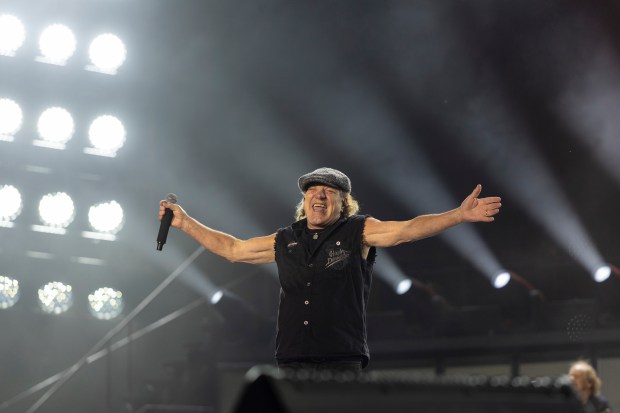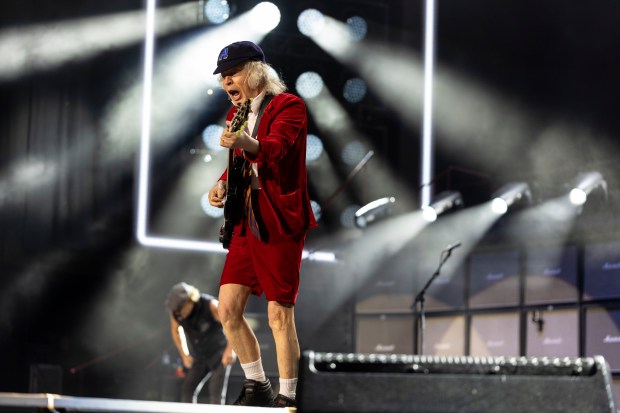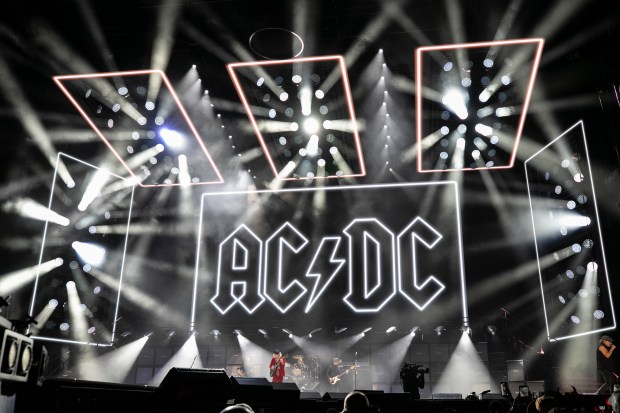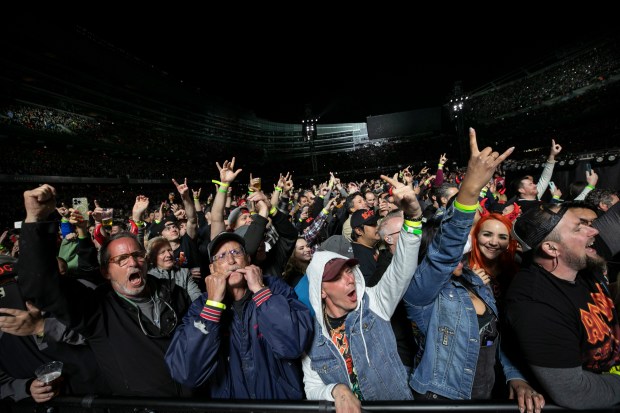Angus Young, his shoulder-length hair now gray and failing to conceal a bald patch atop his head, spun on his back and kicked his legs like a child throwing a tantrum. Wearing his trademark schoolboy uniform with short pants and an Illini-colored orange-and-blue tie, the AC/DC guitarist used his left hand to squeeze the life out of a Gibson SG and his right to pick the strings with vision-blurring velocity.
That scene at Soldier Field on Saturday was at once familiar and silly — and altogether brilliant, especially in its distillation of AC/DC’s inimitable blend of harmless mischief, megawatt power, combustible energy and laser-focused attack.
In town following a nearly 10-year local absence — the longest gap between Chicago concerts in its history — AC/DC went about its business as if nothing had changed with its personnel or its industry since the days of 8-track tape. Or, to quote singer Brian Johnson, speaking to the packed audience near the beginning of the 135-minute show, the group promised “the same stuff we always do.”
Given the Australian collective’s live reputation and topsy-turvy circumstances over the past decade, that pledge carried considerable weight. And after a bit of a sluggish start, AC/DC stayed true to its word. Young and Johnson led the way, leveraging 45 years of shared experience and ignoring the typical limitations of their septuagenarian ages in their steadfast commitment to performing fun, hard, disciplined, bluesy rock ‘n’ roll at high decibel levels.
They were aided by a stadium-geared set that threw one punch to the solar plexus after another, the mix of ubiquitous favorites and a few choice deep cuts emphasizing rhythm first and everything else second. AC/DC can surely recite cuts such as “Back in Black” in its sleep, but the band’s dedication to its craft prevented any shortcuts. The quintet may have nothing to prove except, possibly, to itself.
Column: AC/DC and the underrated art of doing the same thing forever
At this juncture, AC/DC deserves to update the name of its early single “It’s a Long Way to the Top (If You Wanna Rock ‘n’ Roll)” to reflect how remaining a heavyweight often proves far more difficult than making it big in the first place. The equivalent of a nine-lives cat, the band has survived serious challenges since forming in 1973.
The 1980 death of vocalist Bon Scott due to alcohol poisoning, coupled with a creative and commercial freefall during the Reagan era, seemingly prepared AC/DC to handle other setbacks. The ’80s also witnessed a shuffling of drummers and the plugging in of Stevie Young as a temporary tour substitution for his uncle, co-founding guitarist Malcolm Young, who checked into rehab.
Comparatively, the next quarter century went swimmingly. AC/DC regained its mojo, releasing a solid new album every couple of years and filling arenas around the globe. Its 2003 induction into the Rock and Roll Hall of Fame confirmed what most fans already knew: The band stood as a visionaries whose incalculable influence topped that of many of its more celebrated brethren.
In the mid-2010s, fate again reared its ugly head. The 2014 retirement of Malcolm (who died in 2017) and sudden spring 2016 departure of Johnson due to the risk of complete hearing loss threw shade on the future. Guns N’ Roses singer Axl Rose stepped in for Johnson and allowed the group to finish its tour, the finale of which coincided with bassist Cliff Williams’ retirement.
Had AC/DC reached the end? Nope. Surprising everyone, Johnson returned. Equipped with advanced in-ear-monitor technology, he partnered with his old mates on the 2020 LP “Power Up” and got back in the ring. For its current trek, the band recruited bassist Chris Chaney and drummer Matt Laug to sit in for staples Williams and Phil Rudd, respectively.

Admittedly, it felt weird not seeing Williams in his usual spot. Lacking the chemistry of the men they replaced, Chaney and Laug didn’t always muster the wrecking-ball swing, foundations-rattling shake or hospital-corner tightness of their esteemed predecessors. A few songs, “If You Want Blood (You’ve Got It)” and “Thunderstruck” included, never hit full boil and unfurled at a slower pace.
Paging Stevie Young and his steady, sweeping right arm. With him running point for the rhythm section and ironing out kinks, any lingering clunkiness and tardiness dissipated by the time the eerie tolling announced “Hells Bells.” To be certain, this wasn’t AC/DC in its prime with its classic lineup. Johnson’s voice no longer even pretends to scale the extreme highs or possesses the lung strength to hold extended notes. He compensated by adjusting the vocal key, or doubling-up on the word or phrase in question.
But as big-name veteran bands with retooled lineups go, AC/DC sounded engaged, lean, direct, even occasionally indomitable. It fared better than the Rolling Stones last year and “Fare Thee Well” Grateful Dead in 2015, to cite two examples of still-respected peers that soldiered on with new faces. The decision to primarily forgo production excess and stick to the basics — a classic backdrop comprised of a wall of amplifiers bisected by the drum kit and framed by stairs; three video screens primary dedicated to broadcasting the action; a short runway — underlined AC/DC’s obsessive moderation and dogged mentality.
Adorned in a denim Harley-Davidson vest, jeans and newsboy cap, Johnson oozed blue-collar personality. His strained, sandpaper-coarse timbre served as an ideal conduit for songs concerned with boisterous revelries, shady agreements, licentious intentions and musical pleasures. Cackling, screeching, muttering: He nailed the persuasive magnetism of the back-door mercenary narrating “Dirty Deeds Done Dirt Cheap,” hellraising spirit of the rabble-rouser boozing it up on “Have a Drink on Me” and overconfident bravado of the high roller crashing “Sin City.”
With devil-may-care attitude, Johnson found joy in every stanza, operating in total synergy with Angus Young. The tandem’s give-and-take dynamic blossomed on nearly every tune, with the generously spaced chords and steady buildups of the minimalist architecture inviting Young to flourish. He didn’t disappoint.
Still the clever prankster lurking at the back of the classroom, he snarled and gritted his teeth, holding his instrument at a 60-degree angle while dispensing disruptive solos that took the form of cruise missiles aimed at no particular target. His distinctive tones — raw, bluesy, cleanly distorted and proudly overdriven — surged with jolting currents and ultimately bolstered an 18-minute solo that instilled the history lesson of “Let There Be Rock.”
And was there ever, complete with Angus Young, knobby knees and thin ankles, scampering, duck-walking and hopping from place to place. His fireplug vitality surrendered only to his untamed playing, boogie feel and volumes upon volumes of mesmerizing riffs. Robust, substantial riffs that were brass-knuckle tough (“Demon Fire”), convulsive (“High Voltage”), jagged (“Riff Raff”), stacked (“Whole Lotta Rosie”) and folded like intricate pieces of origami (“Stiff Upper Lip”). Young never ran dry or repeated himself, his electricity juicing the group’s catchy hooks and prompting his pint-sized body to visibly shiver.


The extent of his and his cohorts’ wallop can best be framed by a question: How many other bands could afford to bury a signature song, one as recognized, charged and guaranteed to ignite a mass sing-a-long as “Highway to Hell,” in the middle of their set without batting an eye?
Right arm elevated and pointing skyward, the fleet fingers of his left hand racing down the guitar’s fretboard, a knowing sneer washing over his face as he assumed an iconic pose, Angus Young knew the answer.
Bob Gendron is a freelance critic.
Setlist from Soldier Field May 24:
“If You Want Blood (You’ve Got It)”
“Back in Black”
“Demon Fire”
“Shot Down in Flames”
“Thunderstruck”
“Have a Drink on Me”
“Hells Bells”
“Shot in the Dark”
“Stiff Upper Lip”
“Highway to Hell”
“Shoot to Thrill”
“Sin City”
“Rock ‘n’ Roll Train”
“Dirty Deeds Done Dirt Cheap”
“High Voltage”
“Riff Raff”
“You Shook Me All Night Long”
“Whole Lotta Rosie”
“Let There Be Rock”
Encore
“T.N.T.”
“For Those About to Rock (We Salute You)”



